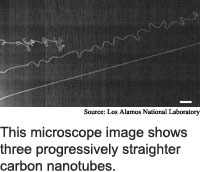
Nanotubes lengthen to centimeters
Carbon nanotubes are rolled-up sheets of
carbon atoms that can be less than one millionth of a millimeter in diameter,
are stronger than steel, and have useful electrical and optical properties.
One line of nanotube research has been to find ways to make the
tubes grow continuously. Long nanotubes could be used as wires in electronic
circuits and woven into macroscopic fibers that could be used to make
extremely strong fabrics and rope. One long-range possibility is using
ultralong carbon nanotubes fibers to make an elevator to low Earth orbit.
Researchers from Los Alamos National Laboratory and Duke University
have found a way to grow very long carbon nanotubes. The researchers have
used the method to produce a nanotube that is a record four centimeters
long. The method has no apparent length limit, according to the researchers.
The researchers grew the long carbon nanotubes using the common
vapor deposition method in combination with a metal catalyst. The process
involves flowing ethanol vapor into a furnace at 900 degrees Celsius.
The vapor reacts with an iron nanoparticle, causing a single-walled carbon
nanotube to grow from the particle in the direction of the gas flow.
The nanotubes ranged from 1.31 to 2.25 nanometers in diameter
and grew at a rate of 11 microns, or thousandths of a millimeter, per
second.
Key to growing nanotubes long, straight and without defects was
a method to keep the nanotubes floating free above the substrate as they
grew. Using this setup, the nanotubes grew straight as long as the iron
particle did not come into contact with the substrate.
The long nanotubes could be used in practical applications in
five to ten years, according to the researchers. The work appeared in
the September 12, 2004 issue of Nature.
Ultrathin carbon speeds circuits
DNA machines take a walk
DNA in nanotubes sorts molecules
Single field shapes quantum bits
Briefs:
Nanotubes lengthen to centimeters
Coated nanotubes record light
Photonic crystal lasers juiced
Lasers move droplets
Molecules form nano containers
Square rings promise reliable MRAM

Research Watch blog
View from the High Ground Q&A
How It Works
RSS Feeds:
News
Ad links:
Buy an ad link
Ad links: Clear History
Buy an ad link
|
TRN
Newswire and Headline Feeds for Web sites
|
© Copyright Technology Research News, LLC 2000-2010. All rights reserved.